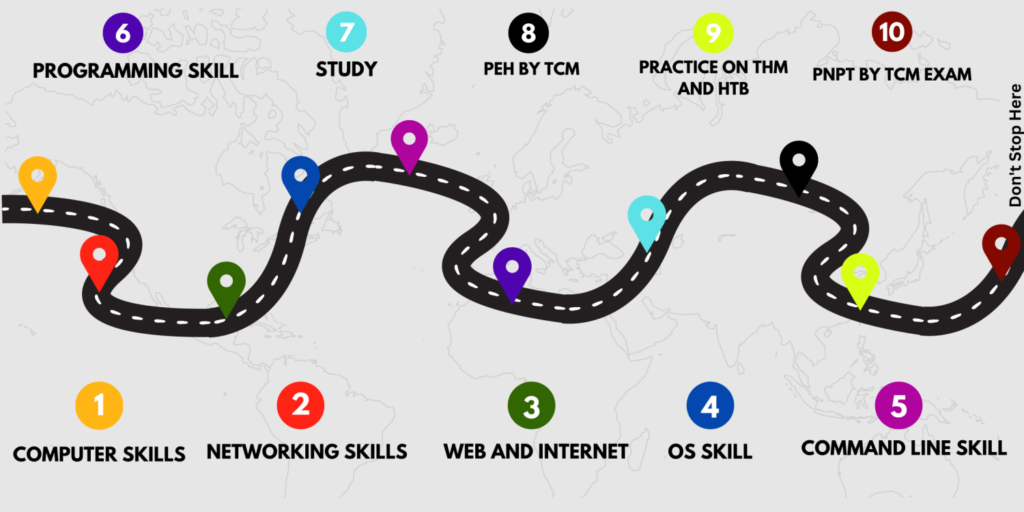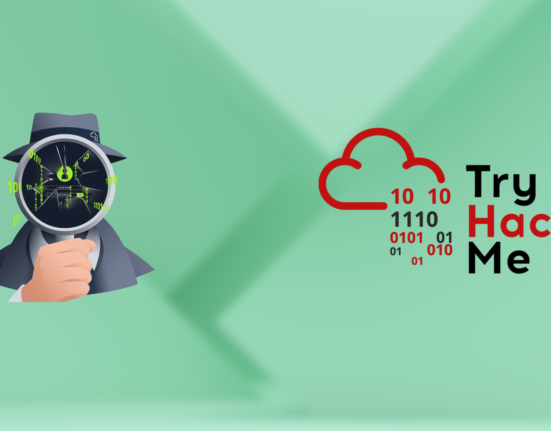Hi everyone, lucifer here with a topic, which is asked by every newcomer while entering the field of cyber security. That is how we should build our careers in cyber security. is it worth it for working full-time in cyber security?
Let me clear you guys one thing a career in cyber security is only possible when you walk into a particular domain of cyber security. This article will help you with understanding many things like, what is cyber security, different domains of cyber security, a roadmap for your career, etc.
before going with the roadmap for your career in 2023 let’s understand some basics of cyber security working and its domains of it. Later I will, so you guys the annual salary in different domains of cyber security. This is not fixed it is only estimated and calculated from many sources on the internet.
What is Cyber Security
Cybersecurity is the practice of protecting computer systems, networks, and devices from digital attacks, theft, and damage. These attacks can come in the form of viruses, malware, ransomware, and other types of malicious software, as well as hacking, phishing, and other types of online fraud.
Cybersecurity measures include things like installing and regularly updating antivirus software, using strong passwords and two-factor authentication and training employees on how to identify and avoid online threats.
The main purpose of cyber security is to protect all organizational assets from both external and internal threats as well as disruptions caused due to natural disasters.
Domains of cyber security
There are several domains or areas within the field of cybersecurity. Some main ones include:
- Network security: This involves protecting networks and devices from unauthorized access or attacks, as well as ensuring the confidentiality, integrity, and availability of data transmitted over the network.
- Application security: This involves protecting software applications and systems from vulnerabilities and attacks, and ensuring that they are secure and compliant with industry standards.
- Endpoint security: This involves protecting devices like computers, laptops, and mobile phones from threats and vulnerabilities.
- Cloud security: This involves protecting data and systems that are stored in the cloud from unauthorized access or attacks.
- Internet of Things (IoT) security: This involves protecting connected devices like smart home systems and wearable technology from cyber threats.
- Information security: This involves protecting sensitive data and information from unauthorized access or disclosure, as well as ensuring its integrity and availability.
- Cybercrime: This involves investigating and combating cyber crimes such as hacking, online fraud, and cyberbullying.
- Identity and Access Management: This involves the process of managing and securing the identities of users and their access to systems, networks, and data.
- Risk Management: This involves the process of identifying, assessing, and mitigating potential risks to an organization or system.
- Threat Intelligence: Threat intelligence is the process of collecting, analyzing, and disseminating information about potential cyber threats and vulnerabilities, in order to help organizations protect against them.
Some Key points you should think
These are some basic key points you should think about before going further in the career roadmap for cyber security.
- Ask yourself Why you need to choose the cybersecurity
- Understand the need for it
- Maybe it’s not easy for going further
- Know your interest in the field of Cybersecurity
Cyber Security persons are also known the ethical hacker in their field.
Roadmap For a Career in Cyber Security

Let’s discuss every step over here in brief:-
1:- Computer Skills
Computer skills refer to the knowledge of hardware, software, I/O, processing methodology of computers, and other related technologies. To better know how they work.
2:- Networking Skills
Networking skills are one of the most important talents to have if you want to be an ethical hacker. you should get knowledge about TCP/IP, ARP, Devices, types, Routing, Switching, etc.
3:- Web and internet
You should know how web servers and applications communicate with each other on the internet. get knowledge about HTTP, HTTPS, DNS, Web Servers, FTP, SMTP, etc.
4:- Operating System skill
In operating system skills, you should master Linux OS because it is the most popular choice for hackers due to its flexibility, open source, portability, and command line interface. You should get knowledge about other operating systems Windows, android, iOS, MAC, and many types of Linux OS.
5:- Command Line skill
You should have the skill to use command line interfaces like CMD, BASH, and PowerShell.
6:- Programming Skill
One thing programming skill is very necessary if you want to be a good hacker or else you’ll just be a script kiddie. You should have to master any one language and should know every language’s basics.
7:- Study
- You need or do not need a degree, but for some circumstances, you should have a degree in Cyber Security.
- Undergrad cyber security course:- B. Tech/BCA/B.Sc.
- Post-grad Courses:- M. Tech/MCA/M.Sc.
8:- PEH by TCM
Practical Ethical Hacking course. In this course, you will learn the practical side of ethical hacking. This course focuses only on tools and topics that will make you successful as an ethical hacker. The course is incredibly hands-on and will cover many foundational topics.
9:- Practice on THM and HTB
THM:- TryHackMe is a free online platform for learning cyber security, using hands-on exercises and labs, all through your browser!
HTB:- Hack The Box is an online cyber security training platform, that allows individuals, companies, universities, and all kinds of organizations around the world to level up their hacking skills.
10:- PNPT by TCM
The PNPT exam is a one-of-a-kind ethical hacking certification exam that assesses a student’s ability to perform a network penetration test at a professional level.
11:- EJPT
The eLearnSecurity Junior Penetration tester (eJPT) is a 100% practical certification on penetration testing and information security essentials. By passing the exam, cyber security professional proves the employers they are ready for a rewarding new career.
Don’t Stop Here
Above is the roadmap but don’t stop anywhere decided what you want to do and do it as you want. later on, you can go through these things in the cyber security journey.
To become an ethical hacker
- learn OWASP top 10
- Learn to operate tolls!
- Make Cyber Security Projects
- Solve real-life problems
- contribute yourself to open source
- combine CS with machine learning, web3, blockchain, cloud, etc
- Automate the recurring
- Learn the art of Google dorks/hacking
- Learn books and became a good reader
- Use GitHub
- Tools and exploit repos
- Seclists, Payload all the things.
- contribute your project here
- communicate with your team on the same project
- Join Bug bounty programs
- Bugcrowd, Hackerone, Intigriti, YesWeHack
- Join a hacking community on Twitter
- Play CTFs Challenges
- Tryhackme, HackTheBox, Proving Grounds
- Security Conferences
- Defcon, BlackHat, OWASP, Null
- Security Forums (JOIN NOW!!)
- Stack, Reddit, Discord
- Contribute!
Professional Certification in Cyber Security
Security
- Certified Ethical Hacker (CEH)
- Offensive Security Certified Professional (OSCP)
- CompTIA Security+
- eLearnSecurity (eJPT)
- GIAC Security Essentials (GSEC/GPEN/GWAPT)
- Certified Information Systems Security Professional (CISSP)
Networking
- Cisco Certified Network Associate (CCNA)
- CompTIA Network+
- Cisco Certified Network Professional (CCNP)
- Cisco Certified Internetwork Expert (CCIE)
Linux
- Red Hat Certified Systems Administrator (RHCSA)
- Red Hat Certified Expert (RHCE)
- CompTIA Linux+
Some Important points for ethical hackers
- Programming is important!
- Have a Hacker’s mindset
- Be verbose, but don’t talk much
- Be social, speak and communicate
- Logical thinking
- Don’t learn it all, but know it all
- Don’t forget soft skills.
The average salary of an ethical hacker in India
| Role | Average Salary (INR) |
|---|---|
| IT Security & Infrastructure | Rs.6,83,676 |
| Security Testing & Auditing | Rs.6,19,354 |
| Security Policies & Procedures | Rs. 1,002,069 |
| Security Risk Management | Rs. 8,43,869 |
| Network Security Management | Rs.5,96,719 |
| Penetration Testing | Rs. 5,46,811 |
| Cyber Security | Rs. 7,18,407 |
Thank you for reading this post, don't forget to subscribe!










